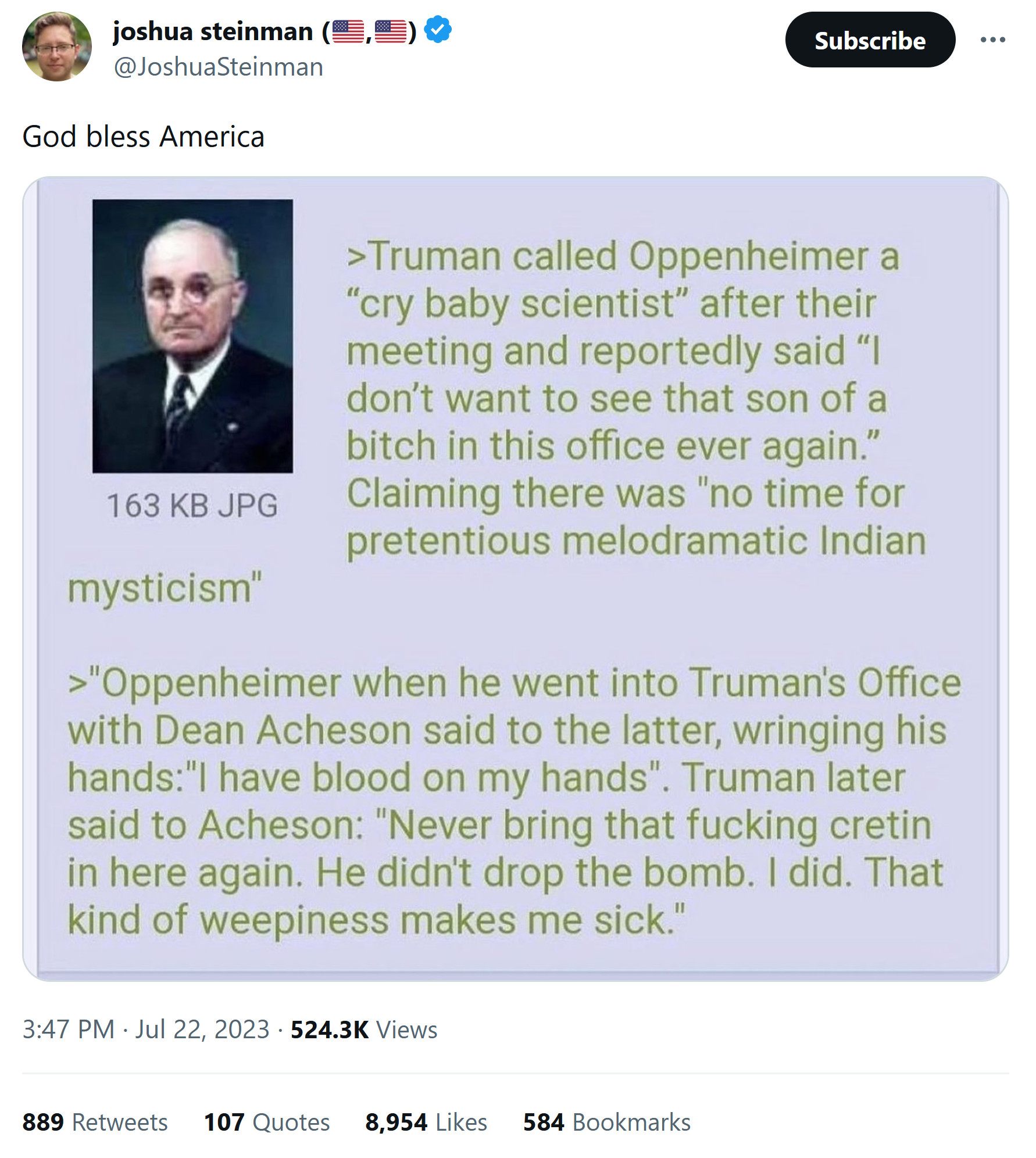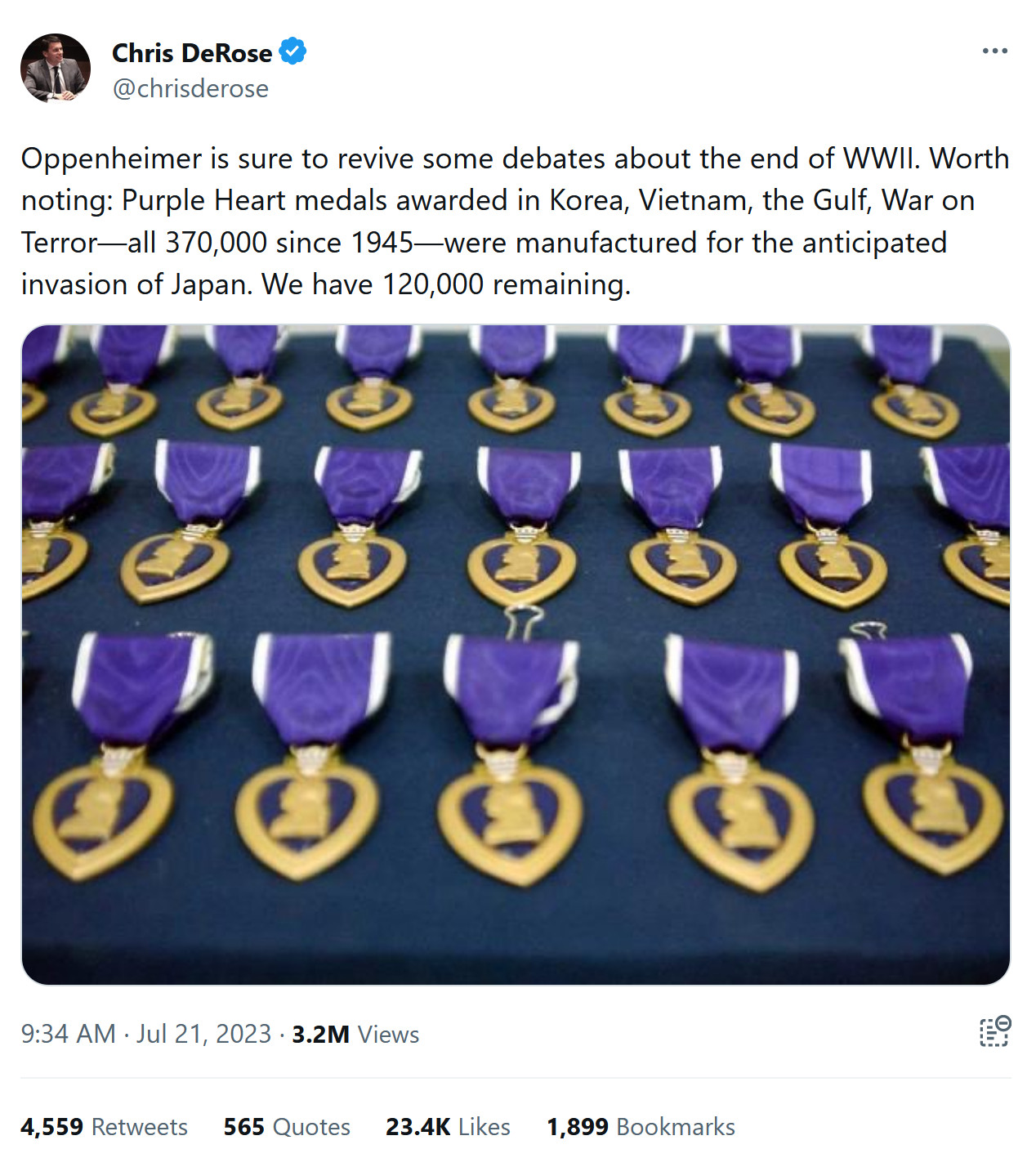¡NO PASARÁN!: Hollywood Shocker: The Authors of the Book Behind Nolan’s Oppenheimer Were Both Editors and Writers at The Nation.
The New York Times seems to be deliriously in favor of the movie Oppenheimer, with assuring us in his New York Times piece that opposition to the Red Scare was good and principled, that he hopes that “Christopher Nolan’s stunning new film on Oppenheimer’s complicated legacy will initiate a national conversation”, and that we can rest assured that even TDS (Trump Derangement Syndrome) — our words, not his — manages to be part of the equation.
the director of the Leon Levy Center for Biography, the New York Times tells us, as well as, more importantly, co-author with the late Martin J. Sherwin of “American Prometheus: The Triumph and Tragedy of J. Robert Oppenheimer”, the book behind Christopher Nolan’s “brilliant achievement in formal and conceptual terms“.
* * * * * * * *
Over ten years after Antony Beevor came out with astonishing revelations from the Kremlin’s archives (his massive The Second World War was published in 2012), the historian’s conclusions are still not accepted by the élites (they are not challenged — with arguments good or ill — they are simply ignored), leading them to call opposition to communism and to the USSR “a political movement characterized by rank know-nothing, anti-intellectual, xenophobic demagogues.”
Astonishingly, [Oppenheimer] had gone so far as to say that the Hiroshima bomb was used “against an essentially defeated enemy.” The atomic bomb, he warned, “is a weapon for aggressors, and the elements of surprise and terror are as intrinsic to it as are the fissionable nuclei.”
“An essentially defeated enemy?” That would be news to the author of this 1946 Atlantic article: If the Atomic Bomb Had Not Been Used. Was Japan already beaten before the August 1945 bombings?
Was Japan already beaten before the atomic bomb? The answer is certainly “yes” in the sense that the fortunes of war had turned against her. The answer is “no” in the sense that she was still fighting desperately and there was every reason to believe that she would continue to do so; and this is the only answer that has any practical significance.
General MacArthur’s staff anticipated about 50,000 American casualties and several times that number of Japanese casualties in the November 1 operation to establish the initial beachheads on Kyushu. After that they expected a far more costly struggle before the Japanese homeland was subdued. There was every reason to think that the Japanese would defend their homeland with even greater fanaticism than when they fought to the death on Iwo Jima and Okinawa. No American soldier who survived the bloody struggles on these islands has much sympathy with the view that battle with the Japanese was over as soon as it was clear that their ultimate situation was hopeless. No, there was every reason to expect a terrible struggle long after the point at which some people can now look back and say, “Japan was already beaten.”
A month after our occupation I heard General MacArthur say that even then, if the Japanese government lost control over its people and the millions of former Japanese soldiers took to guerrilla warfare in the mountains, it could take a million American troops ten years to master the situation.
That this was not an impossibility is shown by the following fact, which I have not seen reported. We recall the long period of nearly three weeks between the Japanese offer to surrender and the actual surrender on September 2. This was needed in order to arrange details: of the surrender and occupation and to permit the Japanese government to prepare its people to accept the capitulation. It is not generally realized that there was threat of a revolt against the government, led by an Army group supported by the peasants, to seize control and continue the war. For several days it was touch and go as to whether the people would follow their government in surrender.
The bulk of the Japanese people did not consider themselves beaten; in fact they believed they were winning in spite of the terrible punishment they had taken. They watched the paper balloons take off and float eastward in the wind, confident that these were carrying a terrible retribution to the United States in revenge for our air raids.
We gained a vivid insight into the state of knowledge and morale of the ordinary Japanese soldier from a young private who had served through the war in the Japanese Army. He had lived since babyhood in America, and had graduated in 1940 from Massachusetts Institute of Technology. This lad, thoroughly American in outlook, had gone with his family to visit relatives shortly after his graduation. They were caught in the mobilization and he was drafted into the Army.
This young Japanese told us that all his fellow soldiers believed that Japan was winning the war. To them the losses of Iwo Jima and Okinawa were parts of a grand strategy to lure the American forces closer and closer to the homeland, until they could be pounced upon and utterly annihilated. He himself had come to have some doubts as a result of various inconsistencies in official reports. Also he had seen the Ford assembly line in operation and knew that Japan could not match America in war production. But none of the soldiers had any inkling of the true situation until one night, at ten-thirty, his regiment was called to hear the reading of the surrender proclamation.
Did the atomic bomb bring about the end of the war? That it would do so was the calculated gamble and hope of Mr. Stimson, General Marshall, and their associates. The facts are these. On July 26, 1945, the Potsdam Ultimatum called on Japan to surrender unconditionally. On July 29 Premier Suzuki issued a statement, purportedly at a cabinet press conference, scorning as unworthy of official notice the surrender ultimatum, and emphasizing the increasing rate of Japanese aircraft production. Eight days later, on August 6, the first atomic bomb was dropped on Hiroshima; the second was dropped on August 9 on Nagasaki; on the following day, August 10, Japan declared its intention to surrender, and on August 14 accepted the Potsdam terms.
On the basis of these facts, I cannot believe that, without the atomic bomb, the surrender would have come without a great deal more of costly struggle and bloodshed.
Flashback: Bill Whittle Jon Stewart, War Criminals & The True Story of the Atomic Bombs (Video).
Related: Harry Truman was not fond of Oppenheimer:


